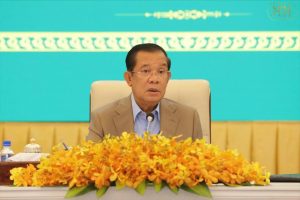Political life in Cambodia, as difficult as it may be, follows five-year election cycles, resulting in long and drawn-out maneuvering by the ruling Cambodian People’s Party (CPP) – and the lead-up to the polls in 2023 is shaping up to be no different.
It’s a scenario that involves cajoling, threats, arrests, and at times outright thuggery, matched by conciliation, a combination that was in full play this week with Prime Minister Hun Sen asserting his inimitable style over the much-depleted opposition ranks.
In the crosshairs was political analyst Seng Sary who, from exile in Thailand, had outlined six hypothetical scenarios for the formation of a coalition government that could potentially include Sam Rainsy, the exiled ex-president of the court-dissolved Cambodian National Rescue Party (CNRP).
“We need to ask him about the six points to establish an overseas government. You have encouraged people to form it. You will be jailed. Not only will you be jailed for this so-called rebel movement, you will be shot. If they see you, you will be shot,” Hun Sen said.
Hun Sen also revealed he had gate-crashed online Zoom meetings held by CNRP supporters more than 20 times amid his repeated warnings not to commit acts of treason.
The government-friendly Fresh News reported that Hun Sen had said his presence was “not to hold political negotiations with the opposition, but to send out his message that his men are everywhere.”
Seng Sary was then indicted but Hun Sen had a change of heart after listening carefully to an interview with The Cambodia Daily and said it was clear the analyst was engaging purely in a hypothetical discussion as an academic exercise rather than advocating for the CNRP.
“I would also like to encourage Dr. Seng Sary to continue with his research and analysis of social issues for the benefit of social science research in Cambodia,” Hun Sen said. “I would also like to tell his wife, children and parents not to worry.”
Cold comfort. Why mention the kids?
But the political shenanigans of the past week were hardly unprecedented.
The CNRP went close to winning the popular vote at elections in 2013. But, put simply, it would never have won enough seats to control the national assembly or form government.
Instead its leaders boycotted parliament and violent protests followed amid unsubstantiated allegations that the poll was rigged. The popular vote count, however, gave the CPP a real fright and set the stage for elections five years later.
Gen. Kun Kim, a close ally of Hun Sen, demanded the removal of CNRP leader Kem Sokha from his parliamentary position, and got it after the politician’s wife was terrorized by 200 to 300 men on motorbikes throwing rocks at their family home in a well-documented, six-hour ordeal.
Then two CNRP MPs were dragged from their cars outside of parliament and bashed just one hour after a military-sponsored anti-opposition rally was staged with Kun Kim again petitioning his demands “for the sake of national security.”
About eight months later, the political commentator Kem Ley was assassinated in broad daylight while having a cup of coffee at a petrol station.
The CNRP was dissolved by the courts and the National Election Committee banned opinion polls predicting electoral outcomes because, as spokesman Hang Puthea said, “past opinion polls caused an irregular environment in society.”
Hun Sen’s CPP then won every seat contested in the 2018 poll and returned Cambodia to a one-party state, a result widely derided by human rights and pro-democracy groups, and Western nations.
Still, people in government would like to think the CPP remains popular.
The party’s traditional support base is in the countryside and has remained forever grateful that Hun Sen ended a 30-year war but they are ageing fast whereas opposition parties, like the CNRP, were able to capture the rapidly growing youth vote.
Currently a mishmash of opposition parties are being cobbled together for elections still two years away, but if 2018 is anything to go by, the CPP faithful have little to worry about.

































